Hindu nationalism: ideology and practice. Part of 2. Voluntary servants of the motherland
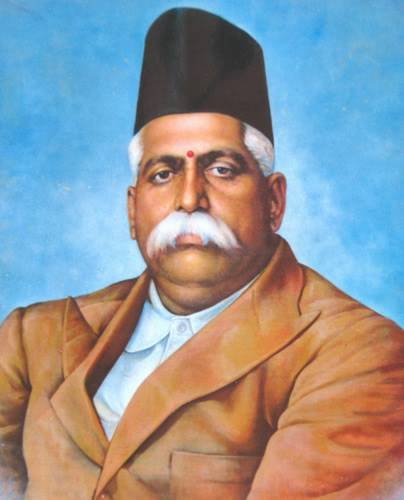 One of the most famous figures of the Hindu nationalist movement, Keshavrao, Baliram Khedgevar (1889-1940), was a countryman of Vinayaka Savarkar and his loyal follower. He was also born in Maharashtra, in the city of Nagpur - in the family of Brahmins - Marathas. But, unlike the lawyer Savarkar, Khedgevar received a medical education and worked as a doctor. The formation of his views was greatly influenced by the ideas of the Hindu Maha Sabha. Initially, Hedgevar took an active part in the activities of the Indian National Congress, but gradually became disillusioned with the moderation of his positions. Where the young doctor was greatly sympathetic to the political research of Vinayaka Savarkar, who, as it seemed to many representatives of the young generation of Hindu nationalists, formulated the most correct principles of the national liberation movement. Like Savarkar, Khedgevar considered it a very important task not only to fight against British colonialism, but also to neutralize the threat of the disconnection of Islamic territories. The basis for the formation of the future of the Indian state were to become the Hindu religion and culture. Khedgevar was critical of Hindu conversion to Christianity and Islam, considering them to be alien to the Indian mentality of religions. Already at the beginning of the 1920s, disillusioned with the activities of the Indian National Congress, Khedgevar thought about the possibility of creating his own political organization that could speak from nationalistic positions. In 1925, the organization was founded "Rashtriya Svayamsevak Sang" - the Union of Volunteers of the Motherland, which later became one of the largest Hindu right-wing organizations in India.
One of the most famous figures of the Hindu nationalist movement, Keshavrao, Baliram Khedgevar (1889-1940), was a countryman of Vinayaka Savarkar and his loyal follower. He was also born in Maharashtra, in the city of Nagpur - in the family of Brahmins - Marathas. But, unlike the lawyer Savarkar, Khedgevar received a medical education and worked as a doctor. The formation of his views was greatly influenced by the ideas of the Hindu Maha Sabha. Initially, Hedgevar took an active part in the activities of the Indian National Congress, but gradually became disillusioned with the moderation of his positions. Where the young doctor was greatly sympathetic to the political research of Vinayaka Savarkar, who, as it seemed to many representatives of the young generation of Hindu nationalists, formulated the most correct principles of the national liberation movement. Like Savarkar, Khedgevar considered it a very important task not only to fight against British colonialism, but also to neutralize the threat of the disconnection of Islamic territories. The basis for the formation of the future of the Indian state were to become the Hindu religion and culture. Khedgevar was critical of Hindu conversion to Christianity and Islam, considering them to be alien to the Indian mentality of religions. Already at the beginning of the 1920s, disillusioned with the activities of the Indian National Congress, Khedgevar thought about the possibility of creating his own political organization that could speak from nationalistic positions. In 1925, the organization was founded "Rashtriya Svayamsevak Sang" - the Union of Volunteers of the Motherland, which later became one of the largest Hindu right-wing organizations in India. Although Khedgevar did not dissociate himself from the campaign of civil disobedience called for by Mahatma Gandhi, his followers took part in clashes with the police. Khedgevar himself believed that the organization would benefit from the militarized structure and aggressive behavior. He considered the fascist party of Italy an example of the structure of the nationalist organization. Like other Indian political figures of the time, including Subhas Chandra Bose and even Mahatma Gandhi, Keshavrao Baliram Khedgevar openly admired Benito Mussolini and Italian fascism. In March 1934, he even held a conference where they discussed the prospects for a possible reorganization of Rashtriya Svayamevak Sangh, modeled on the Nazi Party of Germany and the Fascist Party of Italy.
At the beginning of the 1930-s, the activity of the RCC went beyond the borders of Maharashtra. The cells (shakha) of this organization began to open in other provinces and regions of British India. In 1932, the number of supporters of Khedgevar was just 500 people, but then the bill went to thousands. This was facilitated by the very wise decision of Khedgevar to switch from Sanskrit to Hindi and Marathi in reading ritual prayers at the organization’s meetings. By 1940, the number of organizations has grown to 100 thousand people. But at this time, the “Rashtriya Svayamevak Sangh” lost its first leader. Keshavrao Baliram Hedgevar was sick a lot, he was tormented by incessant pain in his back. 21 June 1940, at the age of just 51, he died. Due to illness the last years of his life, he gradually withdrew from the leadership of the organization. As the leader of the “Rashtriya svayamevak sangh”, he was replaced by another, no less charismatic man - Madhav Sadashiv Golvalkar (1906-1973). He was much younger than Savarkar and Hedgewar — he already belonged to a later generation of Hindu nationalists. Golvalkar was brought by his fellow countryman Savarkar and Hedgevar - he was also born in Maharashtra, in the small town of Ramtek in the Nagpur region. Father Madhava, who worked as a school teacher, had a large family - nine children, but only Madhava was lucky to survive. He enrolled at Benares Hindu University, where in 1928, he received a master's degree in zoology. Having received an education, Golvalkar at first continued to work as a teacher at the same University of Benares. In the 1931 year, as a supporter of the Indian national liberation movement, he joined the ranks of the young organization Rashtriya Svayamevak Sangh. As an educated and active person, in 1933, he headed the RCC branch.
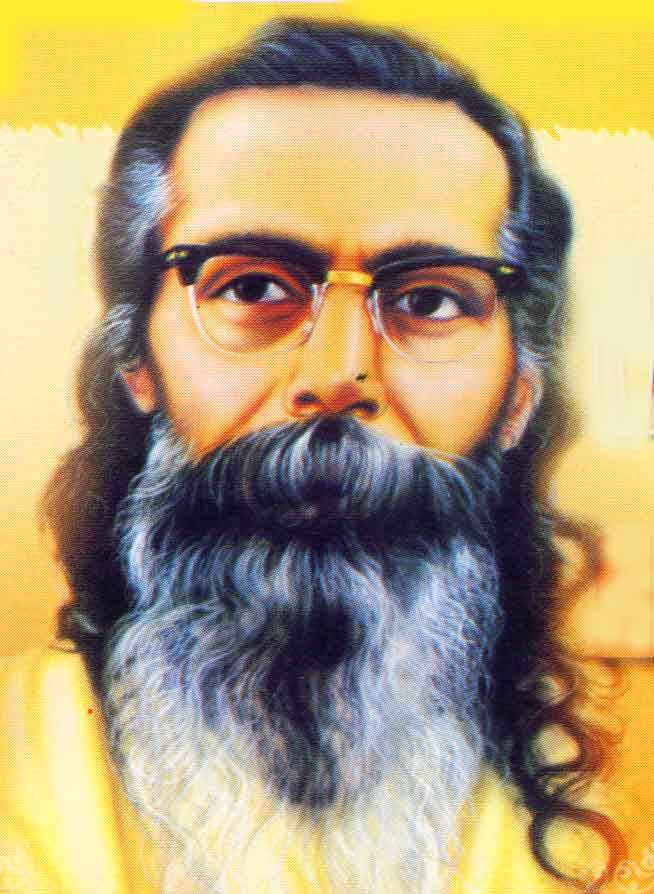
In 1937, Golvalkar went to Bengal, where he became a student of Swami Akhandananda, one of the last students of Ramakrishna. Interestingly, Swami Akhandananda adhered to the idea of no differences between representatives of different religions and accepted even Muslims as his disciples. But Golvalkar, a staunch Hindu nationalist, somehow did not alienate him. Apparently, cooperation with Swami Akhandananda followed the political interests of Golvalkar and Khedgevar, who sought, thus, to raise the popularity of the RCC among the Hindus. In July 1940, Golvalkar was elected president of Rashtriya Svayamevak Sangh.
Under the leadership of Golvalkar there was a further formation and strengthening of the organization. For three decades, he remained its undisputed leader, managing to turn the RCC into a popular All-India nationalist organization. When World War II began, Golvalkar did not hide his pro-Hitler positions. In this, his views even differed from those of Vinayaka Savarkar, who was known to support Britain, and were approaching the position of Subhas Chandra Bose. However, when the British administration demanded that Golvalkar dissolve the RCC militias, he chose not to contradict the colonial authorities and obediently fulfilled their demands. In the end, even British officials were forced to admit that the organization acts strictly within the framework of the legislation and there is nothing to close it. The fact that Golvalkar went to meet the colonialists was explained by the fact that he did not want to give a reason to ban the organization. Moreover, the Second World War was going on and the British authorities would easily have taken the RCC ban because they considered it a very unreliable organization capable of going over to the side of the Japanese troops if they invaded.
Perhaps it was during World War II that it became far more important for Golvalkar to combat the tendencies of Islamic separatism in north-west British India than to British colonialism itself. Since the issue of granting India independence in perspective was already considered resolved, Golvalkar saw the main threat in the upcoming partition of India into the Hindu and Muslim parts. It was in the northern regions of India that the “Rashtriya svayamevak sangh” in the 1940-s unfolded the most vigorous activity, trying to involve as many Indians as possible in their ranks. On the other hand, the Indians themselves, especially those from small entrepreneurs, sought to join the RCC in order to gain support and protection for this organization. It was the RCC militants who played a key role in numerous actions against Muslims in North India.
When Mahatma Gandhi was killed in 1948, the RCC also did not avoid repression. Since the killer of Gandhi Nathuram Godze was a former member of the RCC, law enforcement agencies suspected a number of leaders of the organization, including Golvalkar, of involvement in the assassination attempt. Golvalkar himself was arrested and spent half a year in prison, being released only in August 1948. The government of independent India embarked on a policy of arrest and repression against members of the “Rashtriya svayamevak sangh”, which became a real shock for Hindu nationalists because they did not expect the leaders of the national liberation movement to continue the repressive policy of the British colonial administration. 9 December The 1948 of the RCC launched a campaign of disobedience, which led to the arrest of Golvalkar himself and 60 of thousands of his followers. In January 1949, the campaign of defiance was discontinued.
In the post-war years, the “Rashtriya svayamevak sangh” only gained strength. By the beginning of 1970's, the number of members of the organization reached a million people. For thirty years of leadership, Golvalkar managed to increase the number of the RCC by a factor of ten compared to 100 by the thousands of members of the organization in the last year of the leadership of Keshavrao Hedgevar. As for the political platform, it remained the same - reliance on the Hindutwa concept. Golvalkar stressed that the only full owners of the land of India should be only Hindus as carriers of "Hindu". The Parsis and the Jews who lived in the cities of the coast were regarded as guests, and the Christians and Muslims as "alien." Golvalkar was extremely negative about the conversion of Hindus to other non-Indian religions. But not only Indian Christians and Muslims Golvalkar considered as an object of hatred. He negatively evaluated the Chinese, which is also understandable, since in the 1960-e - 1970-s. China has become a natural geopolitical rival and opponent of India. A lot of complaints from European researchers are positively appreciated by Golwalkar of Adolf Hitler’s policy in Germany 1933-1945, the experience of which RCC activists urged to adopt for possible use on Indian soil.
However, in the modern period, the position of the “Rashtriya Svayamevak Sangh” has changed significantly on a number of issues. So, if Golvalkar allowed himself negative remarks about the Semites, sympathizing with Adolf Hitler and the Nazi ideology and politics, his modern followers are diametrically opposed. The present-day Rashtriya Svaymasevak Sangh occupies an openly pro-Israel stance — like the Hindu Maha Sabha. The fact is that modern Israel is seen by Hindu nationalists as one of the bastions on the path of the spread of Islamic fundamentalism, threatening, as the leaders of the RCC, and Hindu identity. Accordingly, a country fighting against fundamentalists is viewed as a potential ally for India. The RCC harshly criticized a number of unpopular measures of the Indian government, believing that they create unequal conditions for Hindus and members of other faiths. RCC has most of all questions regarding the alleged patronage of the Indian government to the Christian and Muslim minorities in India. The RCC leaders believe that the secular policy of the Indian leadership, verbally aimed at ensuring equal conditions for representatives of different religious groups and communities, in fact turns into the creation of privileged conditions for Christians and Muslims, and adherents of Indian religions, to which the authorities belong, suffer from secularism. more severely.
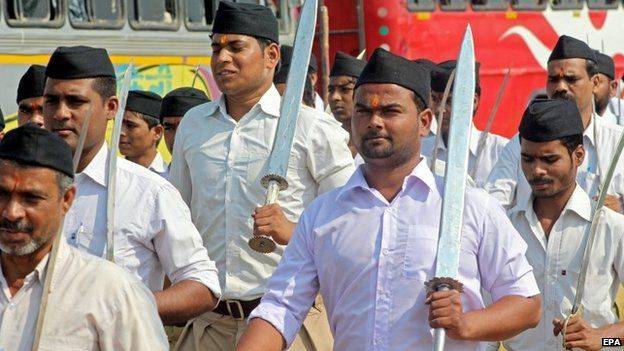
On the other hand, political opponents accuse the “Rashtriya Svayamsyovak Sangh” of fascism. Representatives of the left wing of the Indian political spectrum are particularly active in these accusations. Marxists believe that the RCC actually copies not only the organizational, but also the ideological principles of the fascist parties. The basis for such accusations is the concept of Hindu superiority over representatives of other religious and cultural communities in India, shared by the RCC and other Hindutwa parties. In addition, the hostility from the left meets the RCC negative attitude to the ideology and practice of multiculturalism, since the organization is in favor of a culturally homogeneous Indian society. But the RCC advocates reject accusations of fascism in the organization, citing precisely the fact that the RCC defends not racial or ethnic, but cultural identity. Belonging to the Hindu culture is for the RCC a much more significant factor, the ethnicity. In this respect, the RCC is certainly different from American and European Nazi and racist organizations.
Despite its odiousness, the “Rashtriya Svayamevak Sangh” also does many good deeds for the common people of India who are not part of the political plane. Since the party has organized and disciplined detachments of its followers, it is able to solve many important problems. First of all, organization activists are involved in rescue and repair work after emergency situations and natural disasters. Thus, RCC took part in the restoration of villages destroyed by the Gujarati earthquake in 2001. The campaign involved 35 thousands of party activists. Such actions of the RCC have aroused approval even from those political forces that, in general, treat the right-wing ideology of the party negatively. In 2013, RCC activists helped flood victims in Uttarakhand. In 2006, 57 orphans from the state of Jammu and Kashmir were taken under the care of one of the RCC structures, and 38 of them were children from Muslim families.
However, periodically from India come and news completely different order. We are talking about the facts of the participation of the RCC activists in attacks on representatives of other religious groups, on religious places and institutions of other religions, especially Islam and Christianity. But these actions are supported by certain sections of Indian society.
To be continued ...
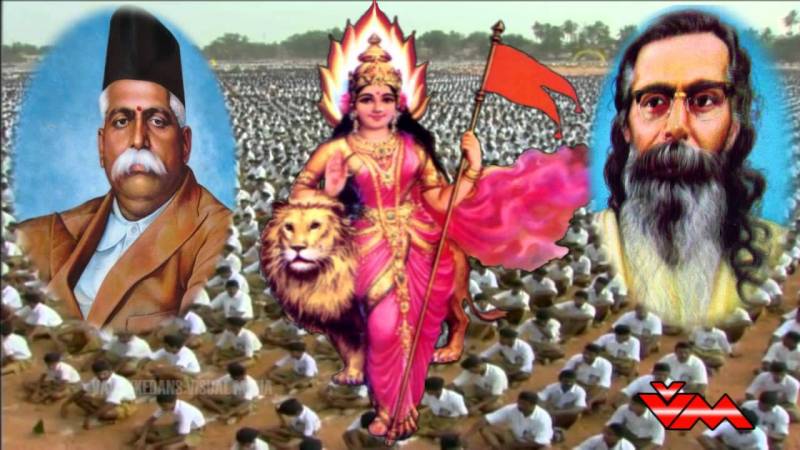
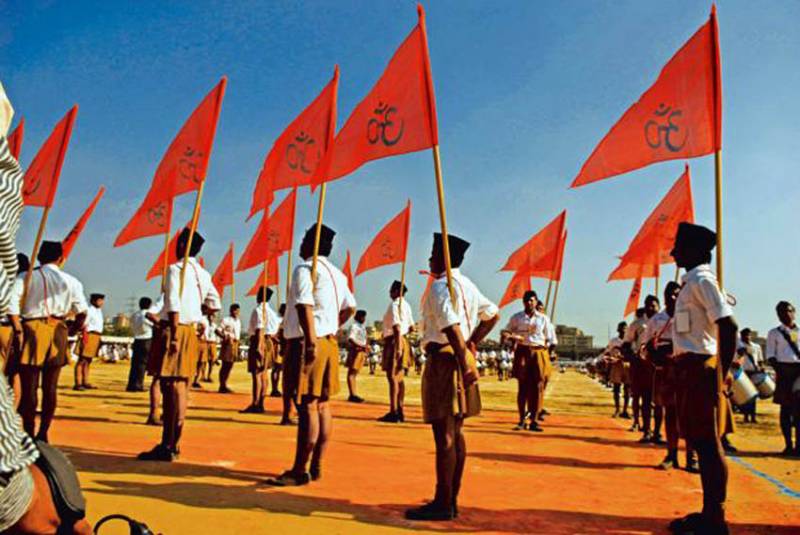
Information